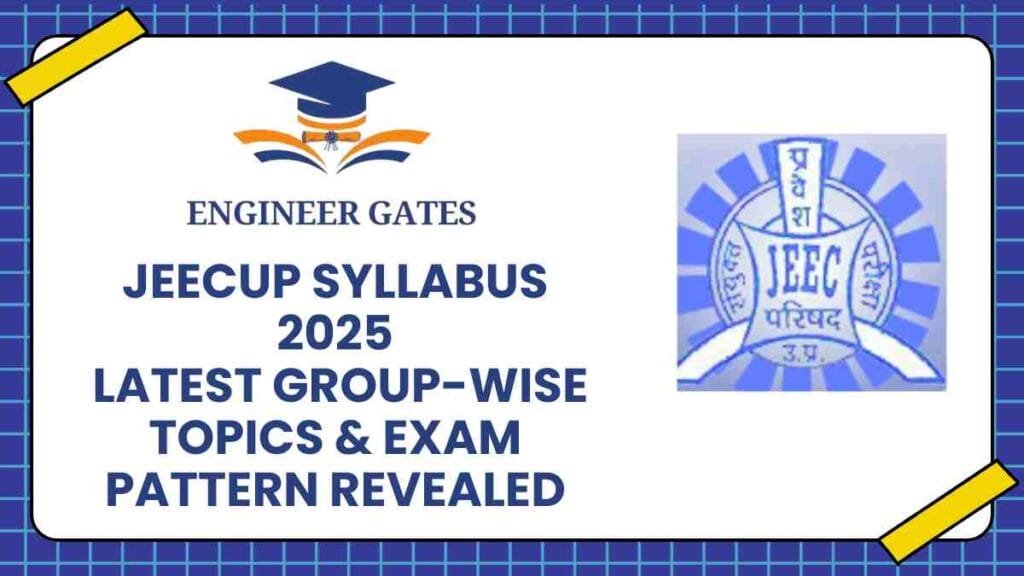Are you planning to give GATE 2026 for Electronics and Communication Engineering (ECE)? If yes, then you need one thing first – a clear plan. And for that plan, you must know:
- What will come in the exam?
- How many marks for which section?
- Which subjects are important?
If you start without this, you might waste time on less important topics. So let’s make it easy. I’ll explain GATE 2026 syllabus, exam pattern, topic weightage, and tips to prepare.
What is GATE 2026 for ECE?
The Graduate Aptitude Test in Engineering is abbreviated as GATE. It is a big exam for engineers in India.
Why is it so important? Because if you score well, you can:
- Join M.Tech or ME in top IITs, NITs, and good colleges
- Get a PSU position with a company like ONGC, IOCL, or BHEL.
- Do research or go for higher studies
So yes, this exam can change your future. But for that, first understand the exam pattern and syllabus.
GATE 2026 Exam Pattern for ECE
The exam is online (computer-based). Here are the main points:
- Time: 3 hours
- Total Marks: 100
- Questions: 65
- Types of Questions:
- MCQ (choose one answer) – negative marking for wrong answers
- MSQ – no negative marking
- NAT (numerical answer) – no negative marking
- Marks Division
- General Aptitude – 15 marks
- Engineering Math – about 13–15 marks
- ECE Subjects – around 70 marks
Here’s an easy table
| Section | Marks |
| General Aptitude | 15 |
| Engineering Math | 13–15 |
| ECE Subjects | ~70 |
| Total | 100 |
GATE 2026 ECE Syllabus
The syllabus has 3 main parts:
1. General Aptitude (15 marks)
- English basics: grammar, sentence making, reading
- Math basics: reasoning, data questions
2. Engineering Mathematics (13–15 marks)
- Matrix, determinants
- Derivatives, integration
- Differential equations
- Probability, statistics
- Complex functions
3. ECE Subjects (70 marks)
- Networks – circuits and theorems
- Electronic Devices – diodes, BJTs, MOSFETs
- Analog Circuits – amplifiers, op-amps
- Digital Circuits – logic gates, flip-flops
- Signals and Systems – signals, Fourier, Laplace
- Control Systems – stability, transfer function
- Communications – modulation, sampling
- Electromagnetics – Maxwell’s equations, transmission lines
Topic-Wise Weightage (Important!)
Some subjects give more marks. Here’s an easy chart:
| Subject | Weightage |
| Signals & Systems | 13–14% |
| Analog Circuits | 11–12% |
| Communications | 9–10% |
| Control Systems | 8–9% |
| Digital Circuits | 7–8% |
| Networks | 8–10% |
| Electronic Devices | 6–8% |
| Electromagnetics | 6–7% |
| Engineering Math | 13–15% |
| General Aptitude | 15% |
Tip: Focus first on Signals & Systems, Analog Circuits, and Engineering Math.
How to Prepare for GATE 2026 ECE?
Here are simple tips anyone can follow:
Start with Basics
- Clear your basics first. Use good books like:
- Signals and Systems by Oppenheim
- Control Systems by Ogata
Focus on Important Topics
Start with high-weightage topics, but don’t skip others.
Solve Previous Year Papers
This helps you understand question style.
Take Mock Tests
Practice time management and accuracy.
Revise Notes
Create formula sheets and brief notes for easy review.
Best Books for GATE ECE
- Network Analysis by Van Valkenburg
- Electronic Devices by Sedra & Smith
- Control Systems by Nagrath and Gopal
Final Words
Cracking GATE 2026 is not magic. It’s about planning and practice. If you know the syllabus, check important topics, and prepare step by step, you will do well.
Start now. Make a plan. Be regular. You can do this!



This information is really helpfully to gate aspirants